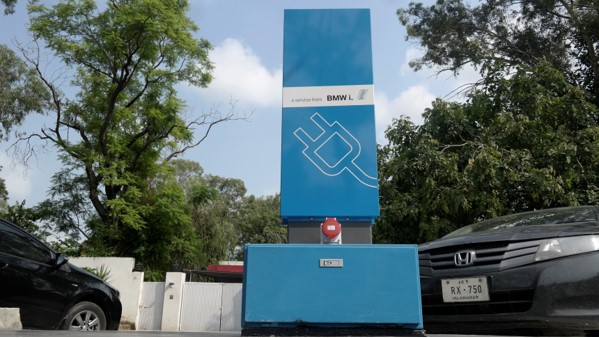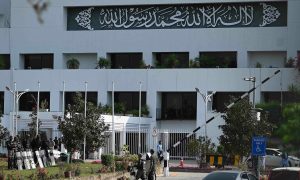Islamabad’s posh Kohsar Market in Sector F-6/3 is not the same anymore. The installation of an electric charging station at its entrance has generated more interest than the restaurants and upmarket café it has boasted about decades. A few decades later, it will go down amongst the country’s first few electric-car charging stations.
Dewan Farooque Motors, its distributor in Pakistan, prefers to work in a low profile for now. We have long been waiting for its queries to be responded to via email, but unfortunately, they were not entertained. Regardless, similar charging stations have been installed in Lahore and Karachi as well with other major cities to follow. They are strategically located in parking lots of busy, posh malls and markets. You can pay the charging expenses with your credit or debit card at the same booth.

Though there are very few electric vehicles (EV) in the country, the German brand (BMW) is investing in creating demand and capture the market. According to reports, the DF motors expects to sell a couple of hundred EVs by the end of the year, which probably include the BMW i8 as that is the only EV on BMW Pakistan’s website.

Since the EV concept is new to Pakistan, it will take some time to catch on. Undoubtedly, there will be soaring demand for EVs not far from now. Cars like the BMW i8 cost around $135,000 [Rs 14 million exclusive of taxes] which most people would not be willing to spend. Over the next few years, Pakistan will remain a market for low-end luxury electric cars. As always, the Chinese will have a field day. Car’s like Toyota Corolla or Suzuki Mehran will soon be replaced by EVs. You won’t have to look hard to find Chery EQ in the nearby street.

Various Chinese companies including QQ [Chery’s manufacturer] are already working on going full EV and aspire to capture sizeable market share by 2020. Pakistan needs to push forward as well. Fortunately, vehicle duties have been reduced significantly in the fiscal budget 2017-18; cars with up to 1200cc can be imported with zero duty, cars ranging from 1201cc to 1800cc would can be imported with 50% less duties, lastly, cars ranging from 1801cc – 2500cc can be imported with 25% less duties than the previous budget. For example, the Toyota Prius would cost around Rs 2.1 million before the budget but now it is priced at Rs 1.815 m. This incentive must encourage manufacturers to export electric cars to Pakistan. Already, the auto policy has received a thumping response from car giants. Market analysts believe that soon Pakistanis will find a large variety of cars racing on the roads.
Will electronic cars succeed?
As more and more electric charging stations are installed, more people will lean into the idea of EVs. Why? The answer is simple: the EVs look even better than their hydrocarbon fueled cars, they tend to have a very solid build and come with advanced feature making them easy to drive. Above all, they are both, eco-friendly and economical. They not only make little noise but also are good for the road due to their lighter weight. The country has long been burdened with oil import, being a key factor in trade deficit. The higher the number of fuel efficient clean energy cars on the roads, they bigger reduction in oil import and lesser emission of carbon elements in the atmosphere.

The middle class will be able to save hard earned income for use on education, health and housing. Hybrid vehicles of Toyota and Honda have quite made significant inroads in Pakistan market, mainly due to the promise of the economy of fuel and maintenance. Even the public institutions such as the Capital Territory Police and the PIA have chosen to opt for the Toyota Prius.
Points to ponder
The first and foremost requirement of an EV is that they must be recharged multiple times in a week, much like a smartphone or a laptop. Though these take longer to charge than a gasoline-run, they offer much more value for the cost, both economically and environmentally. Though the government can integrate solar and wind powered charging stations with a network of motorways and highways being built as part of CPEC, the conventional power run charging stations can be used for starters. The corporate sector will rush to grab the opportunity to meet the demand for charging station. Remember, mushrooming of CNG stations across the country!

In the nutshell, EVs are a major step in the right direction and set to be a massive success. This will also give an incentive to the government to polish its comparatively improving situation of power cuts. Pakistan just needs to overcome its basic issues and with a little bit of responsibility and regulation from the government, things will start to take a good shape.
It’s commendable that the BMW has taken the lead in installing charging stations without much pomp and show, though they may soon be dethroned by cheaper Chinese companies entering Pakistan, or ideally, perhaps, other international companies like Toyota or Mercedes could also make available their EVs in Pakistan.














